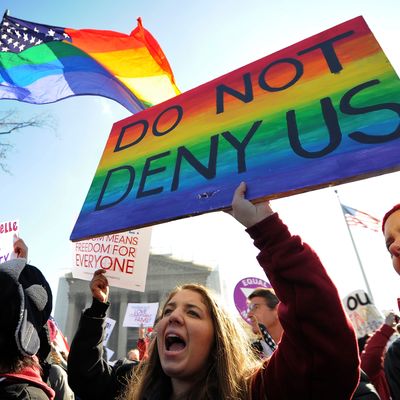
After the Supreme Court heard oral arguments on Obamacare last year, CNN’s Jeffrey Toobin called the game early: “trainwreck for the Obama administration … looks like it’s going to be struck down … enormously skeptical … simply awful … this law is in grave, grave trouble.” He was not alone. And yet, a few months later when the ruling came down, it went the other way. So surely no one is jumping to conclusions this time around, after the oral arguments on Prop 8 and the constitutionality of gay marriage today … Right?
Wrong:
SCOTUSblog, which is closely watched for a few days every year, is being particularly bold:
Beyond 140 character, Tom Goldstein writes, “The bottom line, in my opinion, is that the Court probably will not have the five votes necessary to get to any result at all, and almost certainly will not have five votes to decide the merits of whether Proposition 8 is constitutional.” He imagines “a modest step forward for gay rights advocates, but not a dramatic one.”
Roll Call’s legal affairs reporter is less certain about where Justice Kennedy, who’s thought to be the deciding vote, is leaning:
The procedural question of whether or not defendants of Prop 8 have the standing to argue for it in court was also at play, which could limit the scope of a ruling by the court, according to a (prediction-less) New York Times recap of the day’s arguments:
There was also an extended discussion of a preliminary issue — whether the plaintiffs in the case actually have legal standing to challenge the state court ruling that overturned Proposition 8, the ballot initiative banning gay marriage.
Seconds into the morning hearing, as Mr. Cooper began his argument, Chief Justice John G. Roberts Jr. cut him off and asked him to address the standing issue. It could prove a crucial question, since the court could decide they have no standing and effectively leave in place a state ruling striking down the same-sex marriage ban.
The prognosticators have latched on to that uncertainty. According to NBC, “the Supreme Court indicated Tuesday that it might not strike down such laws”:
Toobin, well aware of his past pundit sins, concurred:
The attorneys on the case, meanwhile, refrained from guessing:
But the New York Times live-blog was quick to point out reporter Adam Liptak’s take last year on how little the oral arguments actually matter:
In an interview with Bryan A. Garner published in 2010 in The Scribes Journal of Legal Writing, Justice Clarence Thomas was asked how often he changed his mind thanks to oral arguments.
“Almost never,” he said, adding that they may make a difference for his colleagues “in 5 or 10 percent of the cases, maybe, and I’m being generous there.”
That is as it should be, said Mr. Estrada, who has argued 20 cases before the Supreme Court.
“Somewhat refreshingly to our citizens,” he said, “the administration of justice has to do with the merits of the case and not entirely to do with the skill of the advocates.”
The skill of our nation’s predicters is, historically, far worse.





























